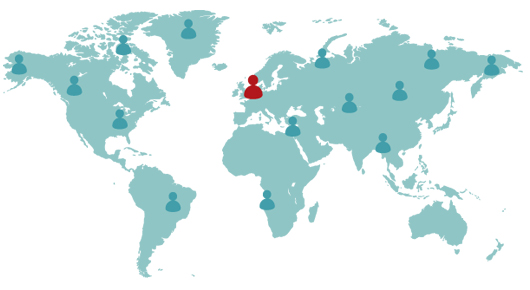A domain name locates an organization or entity on the Internet. Everything on the Internet works because it has an address to link you to. Much like how your telephone works with a phone number and the mail is delivered to the address written on the envelope. Similarly, there is an address associated with your computer and server where a website is sited and where you set your email address. These addresses that get internet traffic to go to are called IP addresses. An IP address is a series of digits and sometimes letters with decimal points or colons. It is for our computers and smart phones to read to locate the server where a website is located.
It is not easy for a human to read and remember an IP address! Imagine trying to remember and type 101.92.53.056 in your browser to reach a particular website? And repeating several numeric combinations just to reach other websites? Most people's brains just don't store numbers that way!
A worded address would make it easier to remember and relate to. An example would be www.prettygarden.sg, which would make more sense to a person. A domain name is simply the front-end display for the IP address.

A domain name leads clients or potential clients to your website. It is therefore important to choose an appropriate name.
A domain name also helps put a professional touch to your emails, as opposed to free email names. Due to heavy subscription to free email providers such as gmail or hotmail, your chosen name is seldom available. Most often, alternative names are suggested with numbers at the end of your original choice. For example, [email protected] is suggested as [email protected] is already used. When such an email address is used for business purposes, it does not give a professional image.
Some of the considerations when choosing a domain name are :
~ A catchy and meaningful name that your user is able to relate to your business or activity. An example would be prettygarment.com.sg as a name that can relate a user to a clothing brand or shop.
~ Short domain names are easier to remember.
~ Your domain name can be your branding and marketing tool. It should be easy to remember and not easily confused or misspelt. Would you be able to remember how to spell and type correctly with names like dusseldorfoldtowntour.com.sg?
Multiple variations are recommended to ensure your name is not duplicated and to avoid customer confusion if another entity or competitor uses a domain name similar to yours. The variations to consider could be :
~ Variation of names such as assist.com.sg, assisting.com.sg
~ Variation in suffixes such as prettygarment.com.sg and prettygarment.sg
A new trend is using special meaning single character or numbers for domain name. SGNIC offers a list of .sg premium names such as single alphabet like "A.sg", numbers of "8", "101", "77777", or single-character Chinese domain names.
Usually, a domain name is used to locate a website and email. A website can be used for promoting and providing information about a business, or for interaction and sharing of information within interest groups, between social circles of various types and even for students.
For business entities, it is undeniably crucial for corporate information, products and service listings, event sign-ups, orders, bookings and requests. Because of the Internet's high penetration, wide reach and speed, many business have also harnessed it to grow their e-commerce services and build their customer base.
Based on the Infocomm Annual Survey* on a focus group of 5,000 Singapore residents, in 2012, there were more than 90% of residents with access to the Internet. More than 50% of residents with Internet access made an online purchase in 2012. Based on the upward trend for the last 10 years, the percentage of online shoppers is expected to grow.
* Annual Survey on Infocomm Usage in Households and by Individuals for 2012

There are several types of domain names. The most common and generic ones are the Top Level Domains (TLD) such as .com, .net, .org. Each of these TLDs has its own specific purpose of use such as .com being for businesses, .org for organisations, and .net for Internet providers. These generic TLDs are sometimes referred to as gTLDs.
Each country also has its own TLD which is known as a ccTLD (Country-Code Top Level Domain). These ccTLDs are represented in two-letter combinations. Some examples include .sg for Singapore, .my for Malaysia, .jp for Japan, and many more. Some ccTLDs have registration restrictions, but some others can be registered by almost anyone in the world. There are also Internationalised TLDs or IDNs which are TLDs for multilingual Internet that use different language scripts, beyond letters (a to z), digits (0 to 9) and hyphen (-). Examples of such are Arabic, Russian, Chinese, Tamil etc.
When a domain name is required, the usual TLDs people think of are .com or .org etc. Many people are surprised to find out that there are other extensions available including specific-purpose ones such as .mobi for mobile websites.
The latest development in domain names is the New gTLD programme. This programme allows qualified applicants to apply and manage specific TLDs in their own business names, city names, interest or hobby. Examples are .kerryhotels, .osaka, .fish etc.
More discussion can be found in the later section under ".SG Domain Name".
The whole system that allows domain name resolution is overseen by the Internet Corporation for Assigned Names and Numbers (ICANN). ICANN is a privately operated, not-for-profit corporation formed in the late 1990s. Operating under ICANN is the Internet Assigned Numbers Authority (IANA) which coordinates the various global resources for the resolution of IP addresses.
For the ccTLDs, they are managed by the respective appointed Registries for each country. The registry will manage the central directory that holds the information pertaining to each domain name under the country code. The central directory is for computers on the internet to look-up the necessary information to find your website. The registries will also administer the rules of registration of domain names under the country code.
In Singapore, the country code ".sg", is administered by the Singapore Network Information Centre (SGNIC). All processes related to domain registration through accredited registrars are overseen by SGNIC.
